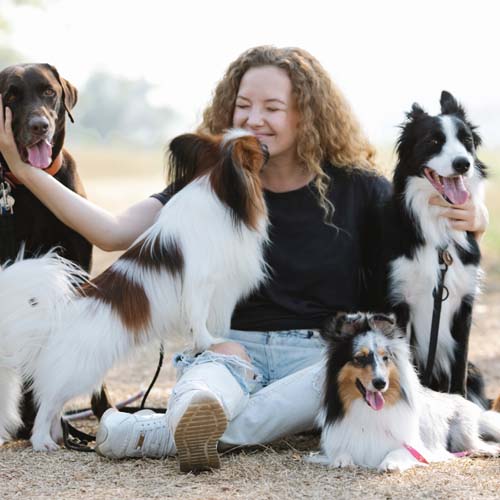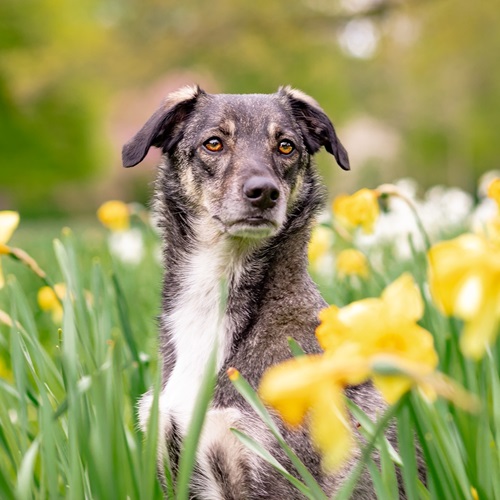What does it mean to be a responsible dog owner?
For starters, it means getting a dog for the right reasons. Dogs are meant to be our companions and to share our lives with us.
Responsible dog ownership begins BEFORE you get your dog. Make sure to properly research which type of dog is right for you. Make sure the dog is a good fit for you home. Do you live in a small apartment? Do have a large backyard? Do you live in the city or out in the countryside? Make sure to discuss with your family who will be responsible for caring for your dog. Talk with a veterinarian about what kinds of costs you must consider throughout your dog’s life. By doing your homework before you even bring your pup home, you are ensuring that you and your furry friend will be a good match, you know what to expect financially, and that your dog will have a forever home.
Responsible dog ownership means properly socializing your pup. Young puppies need to be exposed to a variety of other dogs, people, and environments to help them learn to not be afraid of new situations. Puppies also require a lot of time and training. Responsible dog owners understand that the demands of puppy will be many. Puppies need to be housebroken, a task which often requires a lot of time and patience. They need to learn basic commands and manners and you need to learn how to properly communicate with them. If this sounds daunting, a puppy may not be right for you. Shelters have many older dogs that make great companions. Check your local shelter to see if you can help find a forever home for your new dog.
Here are some tips to help you become a responsible dog owner
Be responsible: Owning a dog is a big responsibility. You need to be honest with yourself about whether you can afford and care for a dog. Think about the money, time, and emotions that a dog will require from you.
Match your lifestyle: Different dogs have different needs. Before you pick a breed, consider your lifestyle — do you have family, are you older, are there young children around, do you live in the city or a suburb, what you do, how you do it, and who you are. Find a dog that will fit in well with your activities and personality.
Make a checklist: Based on your lifestyle, what are the most important features you want in a dog? Think about size, energy level, grooming needs, trainability, and temperament. If you live in a rented apartment or a condominium, are there any limits on the size or type of dog you can have? Answer these questions before you get a dog, because you don’t want to regret your choice later.
Research breeds: After you have your checklist, look for breeds that match your criteria. Do you want a big dog, small dog, one that’s active or a dog breed that’s better with children. Learn more about them by reading, attending dog shows, and visiting the AKC’s breed pages, talking to a veterinarian or speaking with a shelter.
Find reputable breeders: You have a higher chance of success if you get your dog from a trustworthy, ethical breeder. They can help you connect with breeders or rescue organizations in your area.
Ask questions: When you find a breeder you like, ask to see the kennel and the dogs they have. Don’t be shy to ask questions about the breed and the breeder’s practices.
Think about an older dog: Puppies are not for everyone. If an older dog suits your lifestyle better, check to see if a rescue is best for you. Most rescued dogs have already been spayed or neutered and are checked for health and temperament issues.
Be prepared for questions: A responsible breeder or rescue organization will want to know a lot about the kind of home you can provide for a dog. They care as much as you do about making the right match.
Stop jumping on visitors: Teach your dog to sit when they meet someone new. Keep your dog away from guests who don’t like dogs. A well trained dog is a well behaved dog.
Stop begging from visitors: Crate your dog or teach them to stay in their spot while you eat.
Stop barking at strangers: Teach your dog to be calm when someone comes to your to your door or enters your home. Training and socialization will help with this. The more dog is comfortable around strangers the better.
Keep your dog in your yard: A fenced yard is the best way to protect your dog and keep them from roaming. Make sure your dog can’t dig under the fence or jump over the fence to get into your neighbor’s property.
Clean up after your dog: Always bring a bag with you when you walk your dog and pick up their poop. It’s the law in most places, and it’s also polite.




